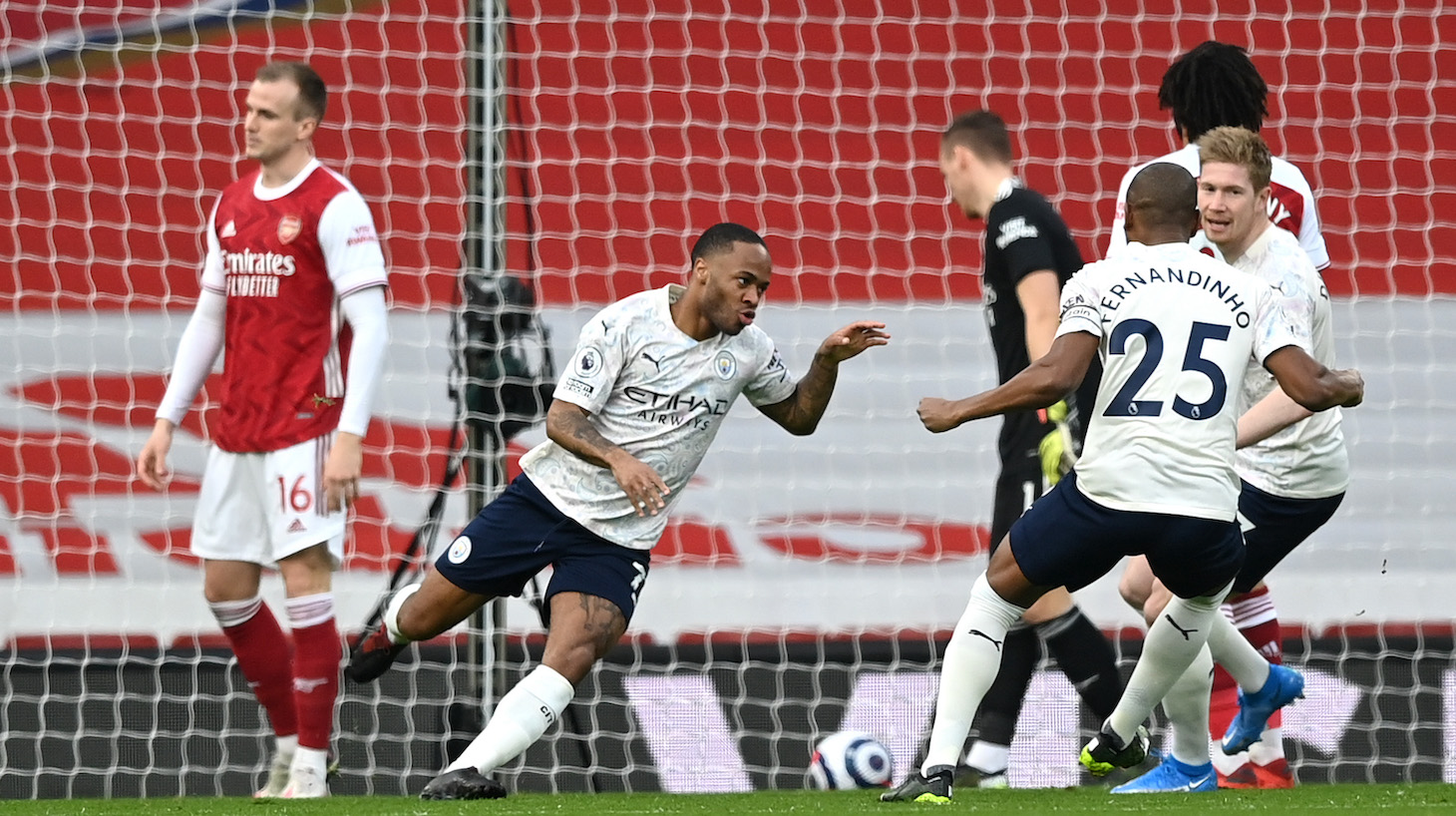There are three months, 13 matches, and 39 points left to play for in the Premier League season, and yet the odds that Manchester City will fail to win the title might as well be zero. Even though the gap separating City and its closest challengers, Manchester United and Leicester City, is only 10 points, the Citizens are firmly in control of the league's fate. And as we've seen so many times this season, when City is in control, there is nothing anyone can do to stop them.
On Sunday, the Mancs wrapped up what was the most difficult stretch of Premier League fixtures in their season with yet another authoritative win, this time beating Arsenal 1–0. The scoreline was tight, but the match wasn't. City scored the opening goal just 77 seconds after kickoff, and never seriously looked like relinquishing the advantage. The away team created chances at will, kept hold of the ball whenever it wanted, and, crucially, managed not to concede a single good opportunity on goal to a team that was trailing for 89 minutes and 23 seconds of regulation. This was one of those very Guardiolian matches of a slight margin of victory obscuring an instance of utter domination.
This weekend's win was the Citizens' 18th consecutive victory in all competitions, 13 of which have come in league play. Even more impressively, the Arsenal match capped a perfect run against some of the best teams in England: first Liverpool, then Tottenham, then Everton, and now Arsenal. In that four-game gauntlet run, City scored 11 goals and gave up only two. City did it in different ways—70 percent possession against Everton, 44 percent against Liverpool—but was at all times dominant.
It is the breadth of this City's strategies of control, during this COVID-19-afflicted season, that make this edition so remarkable. Since coming to Manchester, Pep Guardiola's City teams have always been monstrous attacking forces. With the likes of Kevin de Bruyne, Sergio Agüero, Raheem Sterling, David Silva, and Leroy Sané, prior Man City teams never lacked game-changing attackers who could in an instant break down a defense and set up a scoring opportunity. What certain previous Cities have been less adept at, though, is defending. The team's proactive defending via maintaining possession and pressing after losing the ball have usually worked well, but City could still be exposed on the counter with regularity. The City of last season, for instance, might enjoy some 70 percent of a match's possession and give up only a couple shots, but too often those conceded shots were of concerning quality as opponents found itself running clean through on goal after only a couple passes.
This year's City team looks to be the one that has best mastered Guardiola's longstanding counter-stymieing tactical tweak of keeping his full backs deep and narrow. Though City's playing formation is usually described as a 4-3-3, it more accurately resembles something like the old-school WW, 2-3-5 formations. The center backs stay back, the defensive midfielder is flanked by the two nominal full backs, and the rest of the players pile forward. The five most advanced players put tremendous pressure on opposing defenses with their interchanging and staggered positions and their constant coordinated movements that drag defenders out of position while a teammate moves into the openings. Meanwhile, the defensive midfielder and the two full backs-cum-midfielders provide support as passing pressure valves, and also act as a compact, centralized line of defense ready to stamp out any fires that may result when the front five loses the ball and isn't able to steal it back.
This is a beautiful example of the focus on space-orientation and overloads which Manchester City´s recent 2-3-5 system emphasises in their positional attacks. pic.twitter.com/5V35Tg3dOE
— Eric Laurie (@EricLaurie) February 18, 2021
In previous years the empty spaces to the left and right of Man City's lone defensive midfielder and behind the full backs have been where opponents would feast on the counter. The 2-3-5 plugs those holes without sacrificing the number of players the team can push forward nor those forward players' width and depth on the field that is so crucial to making Guardiola's positional attack work. The effect of watching City work—every piece whirling about in perfect synchronicity with the other pieces, seemingly every single movement compensated by several other movements that make perfect sense to City but leave defenses thoroughly baffled about who went where and what to do about it—is like watching the flying gears of a clock tower.
This relatively unique offensive and defensive mastery has all but won Man City the Premier League already (FiveThirtyEight's projections now put City's title odds at greater than 99 percent), and so the focus naturally moves to European play, where the club has been much less successful over the years. For all City's domestic dominance during the Guardiola era, the club has only gotten as far as the quarterfinals of the Champions League. Aside from the unpredictability of a knockout tournament, a large part of City's European woes have been down to the relative ease of exploiting its defensive weaknesses on counterattacks. Wednesday's Round of 16 matchup against Borussia Mönchengladbach will be the Citizens' chance to lay the foundations of what they must hope will be a deep run in the one competition that has eluded the club's grasp.
Manchester City is presently the best, most well-rounded team in Europe, arguably both the sport's best attack and its best defense. That has also been the case before, however, and it didn't lead to Champions League glory. There's reason to believe this year can be different, armed with this innovative yet throwback formation and playing style, and if City is to have the kind of historically dominant, multi-trophy season Guardiola and the hundreds of millions of pounds spent to assemble the team were meant to ensure, then that journey begins in earnest on Wednesday.






